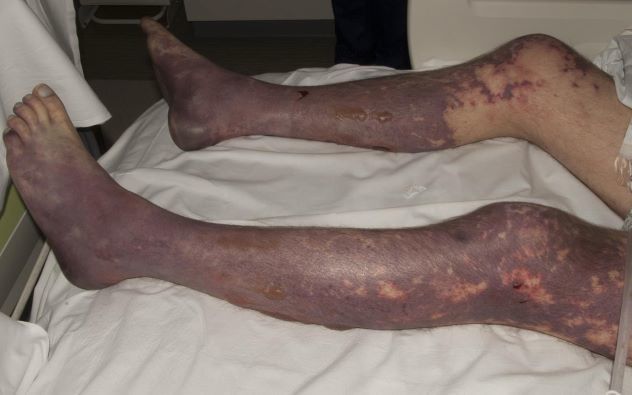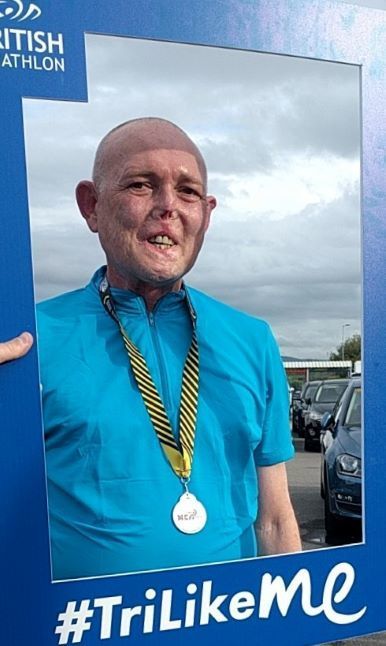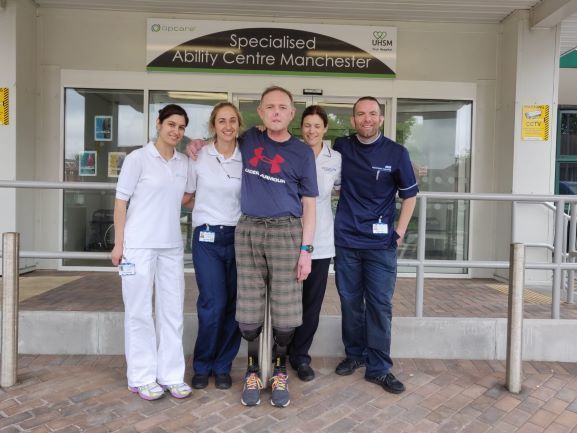‘In October 2016 I was a healthy man, happily married, with a great job as a consultant psychiatrist and proud owner of a grumpy cocker spaniel, Harvey, whom we rescued a few years earlier. We had just booked flights to South Africa for our annual visit to see my mum and sister. Life was good and I could never have foreseen how it was about to change forever.
One late afternoon at work I developed flu-like symptoms. I felt very cold, began to shiver and my muscles were aching. I went home, took paracetamol, and went to bed. I was alone at home and during the following 24 hours became extremely unwell and delirious, without realising it. When my partner Michael got home the following evening, I was slipping in and out of consciousness and my skin was mottled. Hours later I was in an induced coma in ICU, having received a diagnosis of sepsis. I was told I had a 10% chance of survival.
I spent 6 months in hospital, watching my legs and fingers turn black, knowing that they would eventually have to be amputated. I also watched my face becoming scarred and disfigured. I lost part of my nose and my lips were so scarred and contracted that I had difficulty eating, drinking, and talking. I became very depressed and suicidal. I could not imagine life as a disabled and disfigured person. I could not contemplate facing people, much less going back to work and treating my patients, nor going on a night out or having to socialise with friends.

I was fortunate to have an excellent rehabilitation team at the Specialised Ability Centre Manchester, who encouraged me and drove me hard to get back on my feet (pun intended). Within three months of my amputations I was able to walk unassisted, which was a great achievement. But psychologically and emotionally, I was in a very dark place. I had nightmares and flashbacks of my time in ICU. I had lost confidence and I hated leaving the house or seeing other people.
Then, a number of things happened which helped me a lot. I had excellent psychotherapy from a clinical psychologist who specialises in trauma and ICU-related psychological problems. She helped me to overcome my PTSD and build up my confidence. My fantastic plastic surgeon, Adam Reid also introduced me to The Scar Free Foundation, where meeting other people with scars and drawing from their courage, resilience, and positivity, made me see myself in a different light. Someone from the Manchester Evening News wrote an article about me which was then published nationally and internationally and led to appearances on BBC News and the Victoria Derbyshire programme. These opportunities gave me a great platform to promote the work of The UK Sepsis Trust and The Scar Free Foundation and to raise awareness of these especially important issues.
Towards the end of 2018 my rehabilitation team got me to start running and cycling and they encouraged me to take part in a triathlon, something I have never done before. It was such an emotional day and I managed to raise quite a bit of money for The Scar Free Foundation and The UK Sepsis Trust.

Returning to full time work as a consultant psychiatrist was always important to me, but it was a difficult journey. I struggled to get people to understand which reasonable adjustments I needed. It took months to sort things out and during this time I went to the CEO of my Trust out of sheer desperation. She gave me an hour out of her busy schedule and really listened and understood with compassion. That meeting led to the formation of our Disabled Staff Network, which I am proudly chairing. It is such an honour to represent our disabled staff and to see how much change we have been able to bring about in a short space of time.
I guess the message I have is that it is possible to overcome even the most severe things that life throws at us. It is possible to reach your full potential with scarring, or any disfiguring condition. It is possible to do things you have never dreamt of before. It is possible to be a valued and respected member of society. And it’s is possible to have great and fulfilling relationships and to be happy.’

